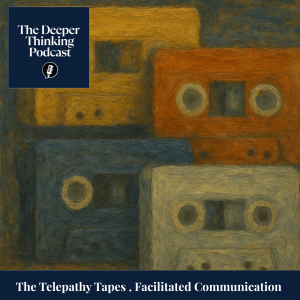
Tuesday Jan 28, 2025
The Telepathy Tapes , Facilitated Communication and the Boundaries of Reality – The Deeper Thinking Podcast Podcast
Facilitated Communication, Telepathy, and the Boundaries of Reality
Exploring the edges of science, consciousness, and belief in what we cannot see.
Is facilitated communication a doorway or a delusion? This episode confronts the tensions at the limits of human understanding. We examine the claims of Facilitated Communication (FC), explore the mystery of The Telepathy Tapes, and interrogate what happens when the desire to believe outpaces the tools of verification. What emerges is not just a scientific debate, but a philosophical inquiry into belief, knowledge, and the cognitive boundaries of what we call real.
We explore how thinkers like William James, Karl Popper, Michel Foucault, and Thomas Kuhn each drew different boundaries around science, truth, and meaning. Is it ever rational to believe without proof? Can something be real simply because it works or feels true? These questions stretch beyond FC and telepathy—they reach into the very heart of human knowing.
This episode is not about defending the paranormal or dismissing the fringe. It’s about staying curious—especially when reality does not give easy answers.
Reflections
- Sometimes, the impulse to believe is as revealing as the belief itself.
- Truth may not always align with proof. But can it still be trusted?
- Who decides what counts as knowledge—and whose voices get heard?
- When communication breaks the usual rules, are we witnessing deception or discovery?
- Science is not static. It grows, adapts, and sometimes resists what it doesn’t yet understand.
- To ask good questions is sometimes braver than demanding final answers.
Why Listen?
- Examine the controversy around Facilitated Communication and claims of telepathy
- Explore William James’ pragmatic theory of truth and Popper’s falsifiability criterion
- Understand how Foucault and Kuhn redefined science as a shifting structure of power and paradigms
- Reflect on belief, skepticism, and the ethics of what we claim to know
Listen On:
Support This Work
If you believe in asking better questions, support the podcast gently here: Buy Me a Coffee.
Bibliography
- Kuhn, Thomas. The Structure of Scientific Revolutions. University of Chicago Press, 2012.
- James, William. The Will to Believe. Dover Publications, 1956.
- Popper, Karl. The Logic of Scientific Discovery. Routledge, 2002.
- Feyerabend, Paul. Against Method. Verso, 2010.
- Goff, Philip. Galileo’s Error. Pantheon, 2019.
Bibliography Relevance
- Thomas Kuhn: Frames how scientific understanding changes through radical paradigm shifts.
- William James: Explores belief as a lived act beyond evidence, especially under uncertainty.
- Karl Popper: Distinguishes science from pseudoscience through falsifiability and testability.
- Paul Feyerabend: Critiques scientific dogma and opens space for pluralism in method.
- Philip Goff: Introduces the possibility that consciousness might be foundational to reality itself.
Sometimes what we call unbelievable isn’t wrong—it’s just early.
#FacilitatedCommunication #Telepathy #WilliamJames #KarlPopper #ThomasKuhn #MichelFoucault #PhilipGoff #Epistemology #PhilosophyOfScience #TheDeeperThinkingPodcast #ScientificMethod #ParadigmShifts #Skepticism #Truth #Belief #Consciousness #Panpsychism
No comments yet. Be the first to say something!